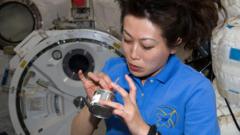In an exciting development for space exploration, the European Space Agency (ESA) has launched an experiment to investigate the feasibility of growing lab-grown food in space. Set to orbit the Earth for approximately three hours before returning to the surface off the coast of Portugal, this initiative aims to explore new possibilities for sustaining astronauts on long-term missions.
The ESA-funded project is driven by the high cost of food delivery to the International Space Station (ISS), which can reach as much as £20,000 per astronaut daily. As human exploration extends to the Moon and Mars, finding efficient food production methods becomes increasingly critical. Dr. Aqeel Shamsul, CEO of Frontier Space, emphasizes that developing food-producing facilities in space is vital for enabling humans to live and work beyond our planet.
The concept of lab-grown food involves cultivating essential food ingredients such as proteins, fats, and carbohydrates in controlled environments. This technology offers potential environmental benefits on Earth, but its primary focus in space is cost reduction. With the vision of utilizing 3D printing for complex meals in orbit, Dr. Shamsul notes, “We could start off simply with protein-enhanced mashed potatoes on to more complex foods.”
In collaboration with Imperial College London, the ESA has sent a mini bioreactor into space via a SpaceX Falcon 9 rocket. This bioreactor utilizes precision fermentation, similar to beer brewing but with genetically engineered processes to enhance nutrient content. Scientists will monitor the cell growth in microgravity to determine its viability for future food production in space.
As experiments are conducted, culinary experts at Imperial College are gearing up to transform lab-grown ingredients into appetizing dishes. While currently using natural proteins and starches, the aim is to create meals that cater to astronauts' diverse tastes. Master chef Jakub Radzikowski is tasked with designing a menu that could satisfy the dietary preferences of astronauts from various cultures, highlighting the goal of providing comfort through familiar cuisine.
Helen Sharman, the first British astronaut, test-tasted the experimental dishes and expressed enthusiasm for integrating more flavorful options into spacefarers' diets. She pointed out that lab-grown foods could enhance the nutritional profile while appealing to astronauts, who often face challenges with food variety during extended missions. This innovative collaboration represents a significant step forward in making human existence beyond Earth sustainable and enjoyable.


















